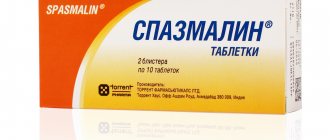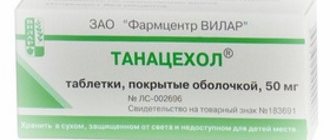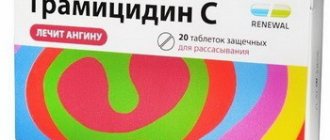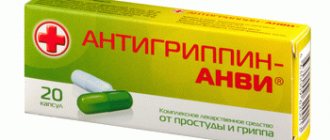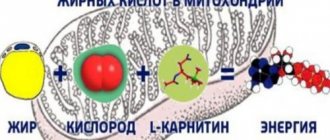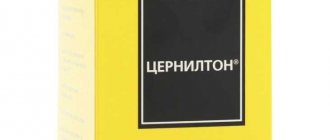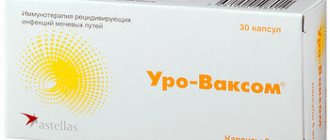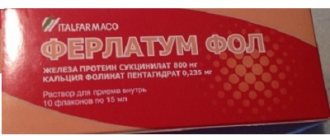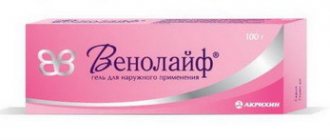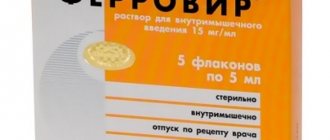Xanthinol nicotinate is a vasodilator that improves microcirculation. The drug has an antiplatelet effect, improves collateral and cerebral circulation, reduces blood viscosity and increases the degree of oxygen supply to tissues. Indicated for Meniere's syndrome, diabetic angiopathy, retinopathy, trophic ulcers of the lower extremities, intermittent claudication, Raynaud's disease, obliterating endarteritis, arterial thrombosis, migraines and dermatoses. Xanthinol nicotinate is contraindicated for bleeding, myocardial infarction, gastric and duodenal ulcers, congestive heart failure and in the first trimester of pregnancy.
Release form and composition
Sold in the form of a solution for intramuscular and intravenous administration, as well as in tablet form.
The tablets are produced in cell-free contour packages (10 tablets each), which are placed in cardboard boxes of 2 pieces.
| Pills | 1 tab. |
| xanthinol nicotinate | 150 mg |
The solution is produced in glass ampoules (2 ml of the drug each), which are placed in blister packs of 5 pieces. or in cardboard boxes of 10 pcs.
| Solution for IM and IV administration | 1 ml | 1 amp. |
| xanthinol nicotinate | 150 mg | 300 mg |
Pharmacological properties of the drug Xanthinol nicotinate
Pharmacodynamics. Xanthinol nicotinate has the effects of theophylline and nicotinic acid: the mechanism of action is realized through blockade of phosphodiesterase activity, competition with adenosine for receptors, accumulation of cyclic AMP, stimulation of the synthesis of nicotinamide coenzymes and anticycline in the walls of blood vessels. The drug dilates peripheral blood vessels, improves collateral and cerebral blood flow, reduces manifestations of cerebral hypoxia, platelet aggregation, improves microcirculation in the retina, enhances the contractile function of the heart, improves metabolic processes in brain tissue in the postoperative period, reduces the level of cholesterol, atherogenic lipoproteins, uric acid , fibrinogen, increases the activity of lipoprotein lipase, enhances fibrinolysis. Pharmacokinetics. In the body, the drug quickly turns first into theophylline and nicotinic acid, then into their metabolites. Excreted mainly in urine in the form of metabolites. With intramuscular administration, the effect develops within 5–10 minutes.
Indications for use
- Raynaud's disease;
- diabetic angiopathy;
- obliterating endarteritis;
- vascular embolism and thrombosis;
- cerebral atherosclerosis;
- intrauterine and postpartum asphyxia (suffocation) of the fetus;
- postthrombophlebitic syndrome;
- obliterating atherosclerosis of the vessels of the extremities;
- bedsores;
- difficult-to-heal wounds;
- thromboangiitis obliterans;
- trophic ulcers of the legs;
- Meniere's syndrome;
- circulatory disorders in the brain;
- atherosclerosis of coronary vessels;
- hypercholesterolemia;
- scleroderma;
- hypertriglyceridemia;
- dermatoses as a result of impaired trophism of vascular origin;
- Buschke's scleredema.
Analogs
Xanthinol nicotinate has several medicinal analogues presented on the shelves of pharmacy chains. Among them are:
Xanthinol nicotinate solution d/i
1 ml of solution contains 150 mg of xanthinol nicotinate. It differs from the tablet form in the faster onset of the therapeutic effect and a wider range of contraindications. The product can act as a direct substitute.
Pentilin
The product is available in the form of tablets with prolonged action. Contains pentoxifylline. Used for the treatment of cerebral atherosclerosis, ischemic heart disease, Raynaud's syndrome, COPD, peripheral and cerebral circulatory disorders, vascular diseases of the inner ear, otosclerosis, impotence of vascular origin and circulatory disorders in the retina and choroid. Contraindicated in pregnancy, lactation, acute myocardial infarction, bleeding, retinal hemorrhage, hemorrhagic stroke, porphyria and hypersensitivity.
Vazonite
A vasodilator in the form of enteric-coated tablets. The active substance is pentoxifylline. Indicated for ischemic heart disease, cerebral and peripheral circulatory disorders, otosclerosis, vascular impotence, bronchial asthma, circulatory disorders in the eye, cerebral atherosclerosis, discirculatory encephalopathy, vascular diseases of the inner ear, COPD and Raynaud's disease. Do not take in case of massive bleeding, myocardial infarction, pregnancy, porphyrin disease, retinal hemorrhages, lactation, hemorrhagic stroke and hypersensitivity.
Instructions for use of Xanthinol Nicotinate (method and dosage)
Pills
The tablets are intended for oral use. Take without chewing, after meals - 1 tablet. (if necessary, 2–4 tablets) 3 times a day. The duration of treatment is 2 months.
Solution
300-600 mg is administered intramuscularly 1-3 times a day. 300-800 mg is administered intravenously slowly, in a lying position, 1-3 times a day. For intravenous drip administration, the dose is 150-900 mg.
In case of acute disorders of the blood supply to tissues, tablets of 300 mg 3 times a day are used simultaneously with parenteral administration.
Applications and dosages
Xanthinol nicotinate tablets should be taken orally after meals. Do not chew the dosage form. It is necessary to take the drug with plenty of liquid.
for adults
Adult patients are prescribed 1 tablet 3 times a day for 2 months. If necessary, the dosage can be increased to 2-4 tablets 3 times a day.
for children
Children need to select individual dosages of the drug.
for pregnant women and during lactation
Drawing up a dosage regimen and selecting therapeutic dosages for lactating and pregnant women should be carried out by the attending physician.
It is prohibited to use the medication in the first trimester of pregnancy.
Side effects
The use of Xanthinol Nicotinate may cause the following adverse reactions:
- Digestive system: rarely - anorexia, attacks of nausea, gastralgia, diarrhea. With prolonged use of the drug in high doses, there is a risk of increased levels of alkaline phosphatase and transaminases.
- Cardiovascular system: possible transient sensation of heat, redness and tingling of the skin of the upper body (especially the head and neck), decreased blood pressure.
- Other: dizziness, weakness, increased serum urea levels, changes in glucose tolerance (with long-term use in high doses).
Contraindications
As evidenced by reviews of the drug Xanthinol Nicotinate, tablets and injections for various pathologies are prohibited. These may be the following conditions and diseases:
- glaucoma;
- kidney diseases;
- arterial hypotension;
- exacerbation of stomach ulcers;
- mitral stenosis;
- chronic heart failure in acute and decompensated form;
- acute myocardial infarction;
- first trimester of pregnancy and breastfeeding;
- individual intolerance to components.
special instructions
- It can provoke a nicotine-like syndrome, which is accompanied by hyperesthesia of the mucous membrane of the mouth and nose (exacerbates the sensitivity of taste and olfactory receptors). Therefore, the taste and smell of alcoholic beverages taken during treatment is perceived as more perverted and harsh.
- When using the injection solution, avoid contact of the drug with mucous membranes or eyes.
- Large doses of the drug can cause arterial hypotension, weakness and dizziness. In this regard, it is required to refrain from driving vehicles and working with complex mechanisms.
Pharmacological group
Xanthinol nicotinate is a drug that improves microcirculation by combining the pharmacological properties of nicotinic acid and theophylline. The drug provokes dilation of peripheral blood vessels, increasing the degree of nutrition and oxygen supply to tissues, as well as improving collateral circulation. Xanthinol nicotinate has a pronounced antiplatelet effect, improves cerebral circulation, provokes activation of fibrinolysis processes and reduces blood viscosity.
By reducing general peripheral vascular resistance and enhancing myocardial contractility, the drug increases minute blood volume and enhances blood circulation in the brain, reducing the manifestations of the effects of cerebral hypoxia.
Xanthinol nicotinate enhances ATP synthesis and oxidative phosphorylation. Subtractively stimulates the synthesis of nicotinamide adenine dinucleotide phosphate (NADP) and nicotinamide adenine dinucleotide (NAD) and increases the concentration of cyclic adenosine monophosphate (cAMP) by blocking phosphodiesterase and adenosine receptors.
Long-term use of the drug activates fibrinolysis processes, stimulates anti-atherosclerotic effects, reduces the level of atherogenic lipids and cholesterol, reduces blood viscosity, increases lipoprotein lipase activity and reduces the degree of platelet aggregation.
The drug causes nicotine-like syndrome, characterized by hyperesthesia of the oral and nasal mucosa. For this reason, when using the medication, the sense of smell and taste may be heightened, which in turn may provoke sensations of a sharper or unpleasant taste or aroma of food and alcoholic beverages
Analogues of the drug
Structural analogues of Xanthinol nicotinate are the drugs presented in the table (Table 2). Not all of these products are currently sold in pharmacies, so it is not possible to indicate their cost.
Table 1 – Structural analogues of Xanthinol nicotinate
| A drug | Estimated cost, rub. |
| Vedrine | Not available in pharmacies |
| Xavin | From 366 |
| Complamine | From 99 |
| Angioamine | Not available in pharmacies |
| Teonicol | Not available in pharmacies |
| Megamin | Not available in pharmacies |
Analog drugs of other pharmacological groups are:
- Agapurin. The drug belongs to the group of purines. It increases the rheological properties of blood plasma and microcirculation. Agapurine contains pentoxifylline. The drug is available in the form of tablets and solution for injection. The product has vasodilating and antispasmodic effects. The cost of this drug is 250 rubles. (60 pcs.).
Vazonite. The drug belongs to the pharmacological group of angioprotectors. Vasonite improves the functions of the vascular system and normalizes the permeability of vascular walls. The product also reduces the risk of blood clots. The cost of the drug is 380 rubles (20 tablets).- Latrain. This medication improves the rheological properties of blood and stimulates microcirculation. The active ingredient is pentoxifylline. The drug stops vascular, increases systolic and minute blood volume. The cost of the solution is about 200 rubles.
- Trental. The drug also enhances microcirculation and improves blood composition. The product is produced in the form of tablets and concentrate for the preparation of infusion solution. The price of the drug Trental is 450 rubles. (60 pcs.). The cost of the concentrate is 160 rubles (5 ampoules).
- Pentoxifylline. This medication is an angioprotector. It also improves microcirculation. The price of this drug is 70 rubles (tablets, 60 pieces), 40 rubles (concentrate for preparing a solution, 10 ampoules of 5 ml).
Reviews from doctors
Aleksenko A. A., cardiac surgeon: “Xanthinol nicotinate has a wide range of applications. Most often it is used for disorders of the heart and vascular system. The drug is relatively inexpensive, reduces the level of platelets, thereby preventing the blockage of blood vessels by thrombotic formations.
The general condition of patients with blood flow disorders improves with regular use of the tablet. It must be taken into account that the drug has a number of limitations, so it should be used only after consultation with a specialist.”
Bezuglaya S. M., cardiac surgeon: “The inexpensive drug Xanthinol nicotinate effectively helps to recover from acute cerebral blood flow disturbances, as well as after surgery.
During the rehabilitation period, it improves the rheological properties of blood, preventing platelet aggregation, and improves overall well-being. Also, with long-term use of the medicine, there is a decrease in cholesterol levels in the blood, which also helps improve blood flow.”
